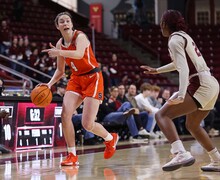International students, Slutzker Center representatives discuss post-graduation options
Two days after she graduates, Minji Hwang will leave Syracuse to go to Europe for a graduation trip with her friends. She has not decided whether to find a job in the United States or go back to South Korea, her home country.
Having spent the past 10 years in the U.S., Hwang, a public relations major, speaks fluent English. She added that she is more familiar with American culture than Korean culture.
However, with a Korean nationality and a full-time F-1 student visa, she will have to apply for Optical Practical Training, a program that allows international students studying in the U.S. to stay in the country a year after graduation to find jobs related to their majors.
Although she is not sure about her future, Hwang has applied for several jobs.
Life after graduation for international students has various possibilities. After earning academic degrees, international students can choose to pursue further education, go back to their home countries or look for job opportunities in the U.S.
The international student population at Syracuse University is growing steadily. In the past nine years, international student enrollment has increased by 129.45 percent, said Mary Idzior, associate director for immigration and student services at the Slutzker Center for International Students.
The Slutzker Center ordinarily has seminars about the application procedure for OPT three times a month. But since February, the seminars have been held weekly.
In 2014, 73 percent of graduated international students applied for OPT. Only eight percent of those who applied were undergraduate graduates.
“A student visa puts you in a different position legally,” Hwang said. “The employer eventually has to sponsor a working visa if they want to hire you. I think that’s definitely something that sets me apart from American candidates.”
Nupur Gokhale, a graduate student in the Martin J. Whitman School of Management, feels the same pressure.
Gokhale was determined to get a job in the U.S. before she came to SU. She received a bachelor’s degree in advertising in India and then came to SU to study digital marketing because she was interested in the business side of mass media communications.
During her time at SU, Gokhale has taken classes such as brand management, digital media management and business analytics, and has also worked on a social media team at Whitman for a year and a half.
Despite the visa problem, Gokhale regards her cultural background as an advantage in finding jobs. She added that her background gives her a different perspective, which is helpful when dealing with international markets.
Although Gokhale has not decided where to live after graduation, she is expecting to find a job in New York City after networking for the past two years.
Yafei Mei, an electrical engineering major, already knew his destination before graduation: Detroit.
Many of Mei’s classmates had found jobs in Detroit, and although Mei said he has not received any job offers yet, he decided to move to the city to look for job opportunities.
Idzior, the associate director at the Slutzker Center, said as an international student adviser for more than 30 years, she has observed some changes in the international community at SU.
“Now more students are either returning home or going to third (world) countries to work,” Idzior said. “The world has changed so much. Now that many countries have strong economies, students tend to follow where the opportunities are.”
She said the international student population is not one-dimensional and that it is difficult to say there is a pattern for them after graduation.
She added that students with different majors make different choices. Students who are getting degrees in applied fields choose to work. She has worked with students who are determined to stay in the U.S., and she has also talked to people who thought through the whole process and are more realistic about their future.
Hwang, the public relations major, is still deciding between going back to Korea and staying in the U.S. Despite the uncertainty of her future, she said she is glad to have had the experiences she gained at SU.
“It ultimately comes down to what I want,” Hwang said. “But I have confidence that whatever decision I make would be the right decision for me.”
Published on May 7, 2015 at 8:00 am





